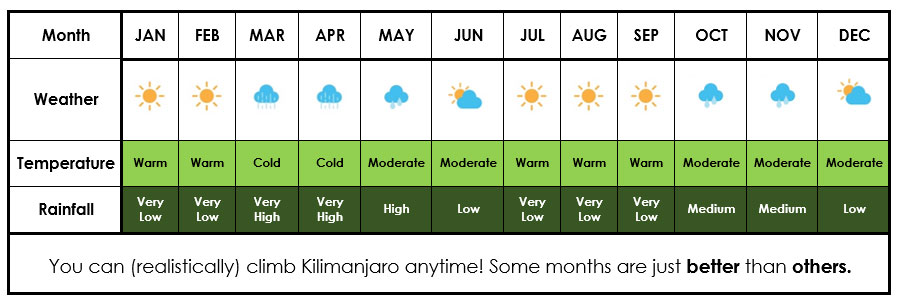Let us Plan your dream Journey
Enquire now and our Travel Expert will get back to you within 24 hours.
HELP ME PLAN
TALK TO EXPERT
Climbing Mount Kilimanjaro is a dream to uncountable adventure lovers worldwide. Out of 30,000 climbers stepping their foot on Kilimanjaro, only 60% climbers are succeeding to reach the top. The reason for the unsuccessful trek to the top is mostly lack of information and preparation. A great element that impacts highly the success rate is the Perfect Time to Climb Kilimanjaro.
When you have decided on Climbing Mount Kilimanjaro, the next important query arising is finding the Best Time To Climb Mount Kilimanjaro. For those who wish to travel in reduced chances of rain and slightly warmer temperatures, it is advisable to climb in the months of January, February or the first half of March. The months of April and May bring profound rain while November and December offer shorter rainy season. Read on to find out the right time to travel to this gigantic mountain and achieve maximum success rate.
The best thing about visiting Kilimanjaro during the high season is that the mountain is generally dry. However, you should not be surprised if it rains on you this time especially within the rain-forest and moorland zones as the mountain receives rain all year round. But generally the rain in this season is extremely minimal. So because it is dry, you will stay dry and comfortable and the trails will be dry and much easier to climb. Therefore, with the discomfort of being wet and trembling cold eliminated, you will have a better opportunity to acclimatize well. Furthermore, during the dry season, the skies are clear and the views are good.
Looking at the negative side of visit the Kilimanjaro during this time, there are so many climbers on the mountain at this time, so you will not feel like you are up on a remote very big mountain. But so people, this works to their advantage as they get a chance to socialize with other tourist groups especially while at the overnight camps.
Nonetheless, the large crowds experienced during the dry season are not a setback for main especially when the think about the good weather they will experience up the mountain during this time of the year.

Well, the thought of bring up the mountain all by yourself is another factor that draws some tourists to trekking during the low rainy season. During this time of the year, there are hardly any people on the mountain, and it’s no surprise when you are alone at a campsite. It is extremely quiet and isolated up the mountain.
Another thing, despite the fact that it rains frequently during this time of the year, the rains in this season normally come in the afternoon, when most of the trekking has been completed. According the climbing schedule on Mount Kilimanjaro, climbers normally do most of trek in the morning which implies that you can actually minimize the amount of time spent on the route as it rains.
The good thing about the rainy season is that you will be able to summit the mountain when the peak is covered with snow a thing that best displays the beauty and uniqueness of this mountain, and the most breathtaking sights on the Kilimanjaro are in the morning right
Are you looking for a month wise analysis for choosing the right time in Climbing Mount Kilimanjaro? We are here to solve your query:
With breathtaking clear skies in the mornings and evenings, this period is rightly considered the Best Season To Climb Kilimanjaro.
The temperature is warm during the day, while nights are colder during this season.
This season is the peak time for Kilimanjaro trekking as it is the migratory season for the wildlife. However September is comparatively quieter and warmer is considered the Best Month To Climb Kilimanjaro.
Heavy rainstorm is expected every day on Kilimanjaro during this period. It is not considered as a great time to trek the mountain.
Before the short and refreshing showers begin you can travel in October to trek this mountain as it is considered a great time for climbing, getting in just before the rains do, but when many of the crowds have gone home.